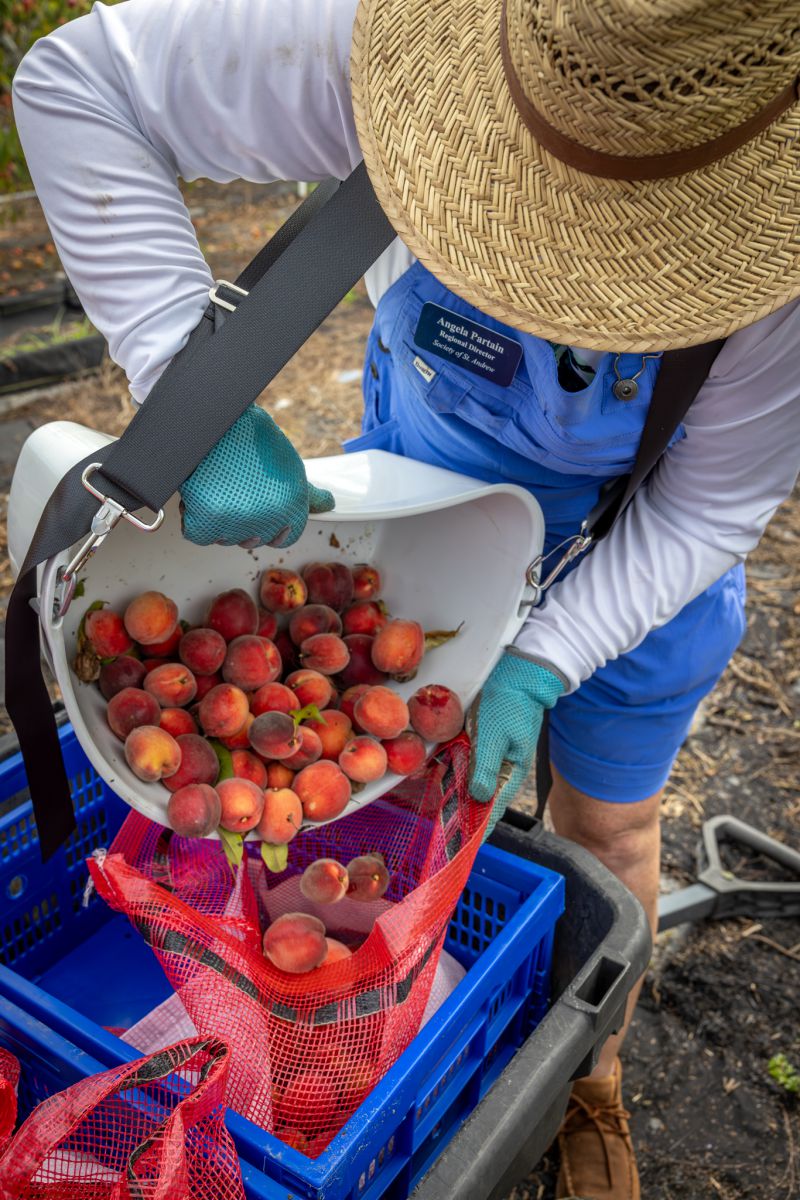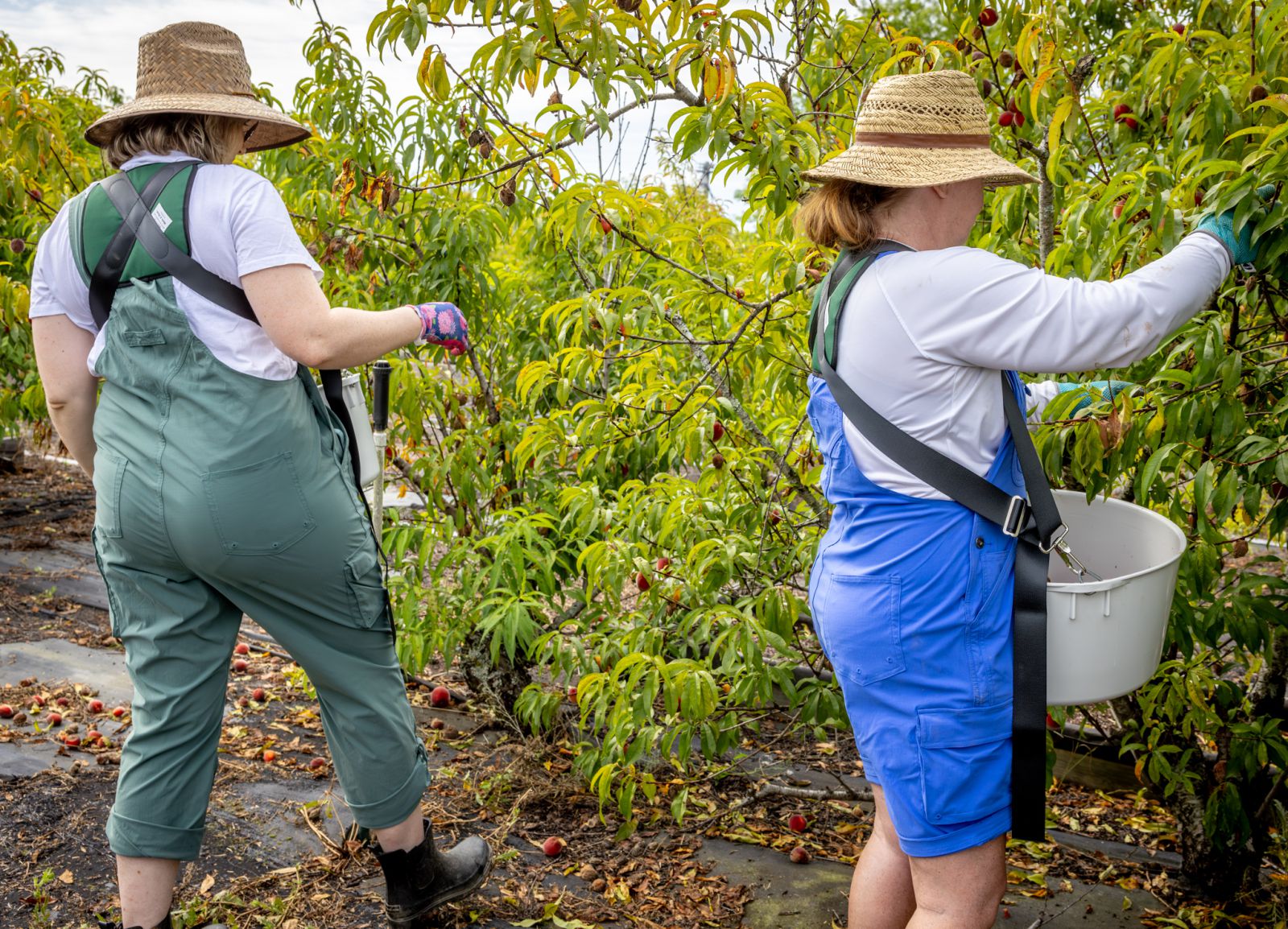Newsroom
Feeding families, ending hunger
Posted on Aug 07, 2025
.jpg)
Researcher Bipul Biswas, Ph.D., picks a peach from his experiment plot on the Fort Valley State University campus farm.
In the United States, people waste 92 billion pounds of food and throw away more than $473 billion worth of food annually, according to Feeding America.
To combat this national issue, the Society of St. Andrew brings people together to harvest and share healthy food, reduce food waste and build caring communities by offering nourishment to hungry neighbors. It is a national nonprofit that has existed for more than 44 years.
Fort Valley State University (FVSU) connected with two representatives from the Georgia office in Macon in 2024 to support the organization’s mission. As an 1890 Land-grant University, FVSU is also committed to empowering underserved communities through educational programs like food preservation and community gardens.
Angela Partain, Georgia regional director of the Society of St. Andrew, said they partnered with FVSU in the past before meeting longtime researcher Dr. Bipul Biswas.
“He loved the idea of what we do, which is to share abundance with people in need, such as marginalized communities and families facing food insecurities. We bonded quickly,” she said. “I had been wanting to get into the agriculture side of this school.”

Angela Partain of the Society of St. Andrew pours a bucket of freshly picked peaches into a sack.
The Society of St. Andrew in Macon gleans and distributes fresh produce to feed Georgia communities. In 2024, through September, they gleaned and distributed 1,192,228 pounds of food, shared 4,768,912 servings of fresh food and held 102 events to rescue and share food. Also, 537 volunteers engaged in hands-on service, and the organization connected with 99 recipient agencies and partners.
The partnership with Biswas came about due to his established peach orchard on FVSU’s campus to conduct in vitro studies for short-life evaluation and his experience with hydroponics gardening. He invited Partain and Anna Foreman, Georgia program coordinator, to visit the research plot to glean peaches.
“I’ve worked with Fort Valley farmers. We are also a charitable partner at the Southeast Produce Council. This was the final connection of the loop,” said Partain, who has been the director for three years.
She emphasized the importance of capturing food waste and redistributing it back into the community. She said this waste happens in the fields, transportation, supermarkets and restaurants.
“Our mission is to end agriculture waste and hunger,” Partain said. “This is our first partnership with a research farm. We are hoping to be educated on the value of hydroponics and take that information to surrounding communities interested in starting community gardens. With hydroponics, you can harvest all year long, so it is a sustainable program.”
Partain noted a lot of marginalized people do not have access to fresh fruits and vegetables. Their goal is to improve the quality of the food going into the charitable food system.
“While they do get fresh fruits and vegetables, there oftentimes is a storage problem. With our organization, we don’t store it. We do direct distribution. Produce goes from the farm to the fork within 24 to 48 hours,” she said.

Partain and Anna Foreman, also with the Society of St. Andrew, harvest peaches on the Fort Valley State University campus farm.
The peaches she and Foreman gleaned on FVSU’s campus amounted to 65 pounds. They planned to share them with approximately 16 families facing food insecurity. That would give each family around 4 pounds, which equals 16 servings. They also returned to visit the specialty crop greenhouse to harvest fresh lettuce and kale growing in the hydroponics system.
“We identify food deserts, commercial farmers, backyard farmers and farmers markets, as well as recipients like churches and food banks. The food is given away at no cost,” Partain said.
The organization is funded by support from fundraisers. “The more funding, the stronger and larger the program,” she said. “Those relationships are critical.”
Foreman, who works with the volunteers and farmers, serves as the primary liaison with gleaning and moving products. She has been with the organization for a year.
“It has been a really rewarding experience because we get to make a tangible change,” Foreman said.
Although a small staff, they have more than 500 active volunteers.
“We partner with so many nonprofits to get food moved, which is amazing. We need the influence of people who have the same heart as we do with the mission to end hunger and prevent waste,” Foreman said.
To volunteer, donate or collaborate, visit https://endhunger.org/georgia/.
- Categories:
- FVSU Agriculture College